How 'The People's Joker' Got Away With A Heartfelt Batman Parody
Gotham Award Winning director Vera Drew on parodying DC Comics with mixed media, building a stacked comedic cast, and the art of heartfelt punk filmmaking.
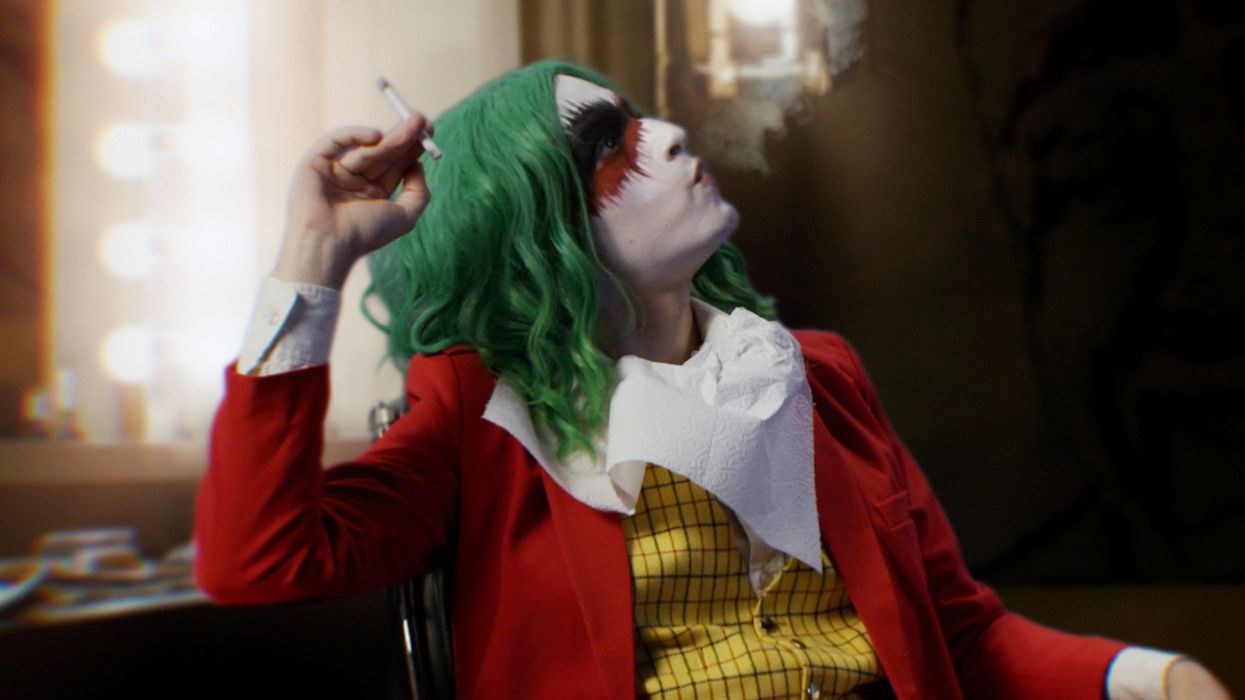
The People's Joker
Editor's note: this interview is reposted in honor of Vera Drew's Breakthrough Director Award at the 2024 Gotham Independent Film Awards.
Ah, comic book movie discourse. As tired as we all may be of shooting the shit about "Marvel flops" and "SnyderWhatever" there is one promising outlier that's made quite the name for itself on the fringe: the mixed media, trans coming-of-age DC comics parody The People's Joker.
Vera Drew's (dare I say) comic book masterpiece is everything a good comic book movie has the potential to be. It uses the larger-than-life mythos built over years of comic book storytelling to explore something very personal and human in a way that a traditional grounded story never could. I know you read my work, Kevin, so take note.
And as an avid comic book fan myself I really loved this movie.
Below, we were lucky enough to chat with Vera about how she assembled all the different media elements to make this patchwork parody gem, working with a lawyer to avoid a lawsuit from Big DC, and sticking to your guns (i.e. heart) as an artist and filmmaker.
Not to mention some fun insider tid bits for all you alt comedy fans out there. Read it and weep.
Editor's Note: the following interview is edited for length and clarity.
How 'The People's Joker' Came to Be
"I was really fortunate because I had such a talented group of people working on this with me, especially just as far as... This is the first feature film I made. For it being my first feature film, on an anomaly level, I'm very lucky to have such a crazy big community of people that really helped me bring this together.
That team was formed shortly after Bri LaRose and I started writing the movie. We started writing it, I think, end of April 2020. And then I used to have a web series called "Hot Topics with Vera Drew," which is the only web series with the express purpose getting Vera Drew sponsored by Hot Topic.
I was making it in an earnest attempt to get sponsored by Hot Topic just because most of the clothes I wear are from there. They never sponsored me. They did follow me on Twitter, which is appreciated.
At that it was still kind of a remix movie. This really started as the idea for, it was originally like a feature-length Everything Is Terrible-style film or something. But then I put that call out there to any artist, or animators, or musicians, or actors, or whoever, that if they wanted to get involved in this, to go to the website and let me know what they do and what they'd want to bring to this. And I really was expecting maybe 10 or so people to reply, but it was hundreds of people and it was a lot of people too who didn't really have experience or really desire to make film.
It was a lot of just artists and visual artists and people who make stuff, but not necessarily for film, which was exciting to me because I knew in that instant like, oh, this is going to be a movie that looks like no movie ever made just because of that diversity of aesthetics. And I think that was really when the shift from found-footage remix movie to mixed-media parody movie kind of happened was just when that team of people formed. And it was a cool moment.
I mean, it was very validating just because not a frame of footage had been shot yet. We didn't even have a completed script yet ahead of that announcement."
On How All This Batman Stuff is Legally Safe
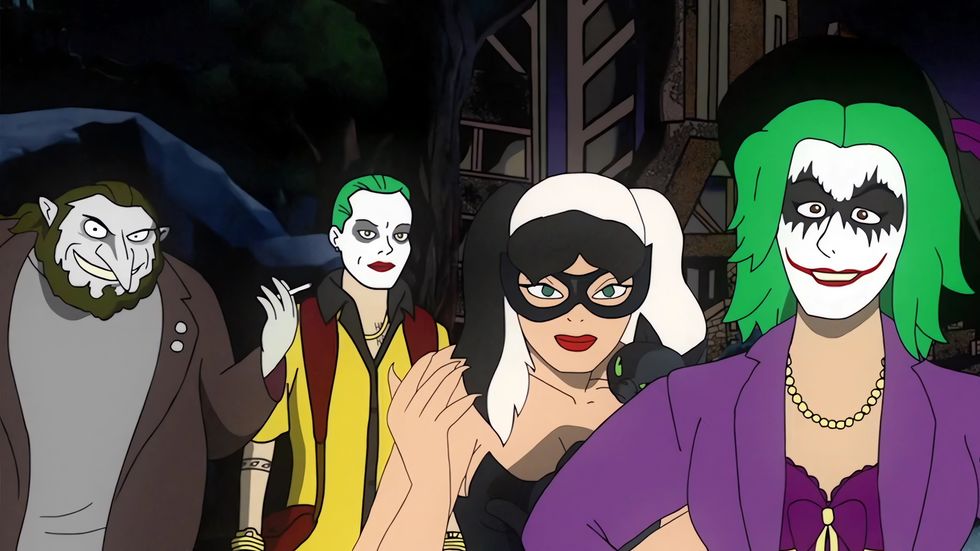
The People's Joker
Courtesy of Altered Innocence
"It's crazy because it's cool that when people will watch it, they feel like I got away with something because I don't really have that experience. My experience really was, it just took so much planning when Bri and I started writing it... Because I am a lifelong DC Comics fan—watching Nicole Kidman in Batman Forever was one of the first moments I realized I was trans.
So these characters mean a lot to me, and I am obsessed with the deep cut stuff. I mean, I love all the usual books and stuff, but I'm a big fan of Grant Morrison's portrayal of Emperor Joker. A lot of the comic book and graphic novel runs, not everybody's really into that stuff. Joker grabbing Batman's ass basically just being a gay character.
And Bri, Bri doesn't watch comic book movies. She watches queer coming-of-age movies, and I think one of the few movies that we both have seen, and both love is Little Women. We have very few commonalities in our artistic influences.
So I was really coming in with a lot of that deep lore stuff and also coming in with the perspective of, we really needed to keep ourselves protected. I had a pro bono lawyer at that script stage that was working with me, and they came up with a list of rules and guidelines that I needed to follow to really have all this fall under parody. The main one being the character designs that we use had to be original character designs.
So our version of the Joker, yeah, there's some inspiration pulled from Jack Nicholson's Joker, but it's actually way more inspired by '90s anime villains and stuff. The look that we came up with and drag queens distressed makeup.
And then we have a Penguin in the movie, but it's not like any penguin you've ever seen in a movie before in a Batman movie. It's like a weird real life Judd Apatow character or something, but he just looks like Penguin.
As far as the deep cut lore things, the reason I was able to do that was because the pieces of Batman lore in DC lore that are in this film are in this film because they're vehicles and mechanisms that I'm using to tell my story or to make direct commentary on these characters. The idea of Super-Sanity specifically, which pops up in Grant Morrison's Arkham Asylum book. The basic premise of that is that Joker is so insane that he's basically a real life Bugs Bunny who can pierce through reality and knows he's a comic book character and that he's a part of this grand design. He's actually smart.
And when I read that, because that book didn't come to me until later in life, I had been a Grant Morrison fan for years, but it wasn't until I started transitioning and sort of processing a lot of my PTSD from my childhood and a relationship that I was in that I really connected with the Super-Sanity thing, but I connected it with it as somebody who is a trauma survivor and is very much coming at it from this trans experience. I really do think my trauma and the stuff I've gone through and the fact that I've gotten to have a very complex and beautiful and specific gender experience has allowed me to pierce through reality in this super sanity way.
So yeah, that's why that stuff's able to be in there, and in that context. It's the same reason why we were able to make one of the characters like a Robin, a former Robin with a lot of trauma because nobody's ever really used that character in that way to talk about that stuff."
Assembling a Comedy Justice... Team
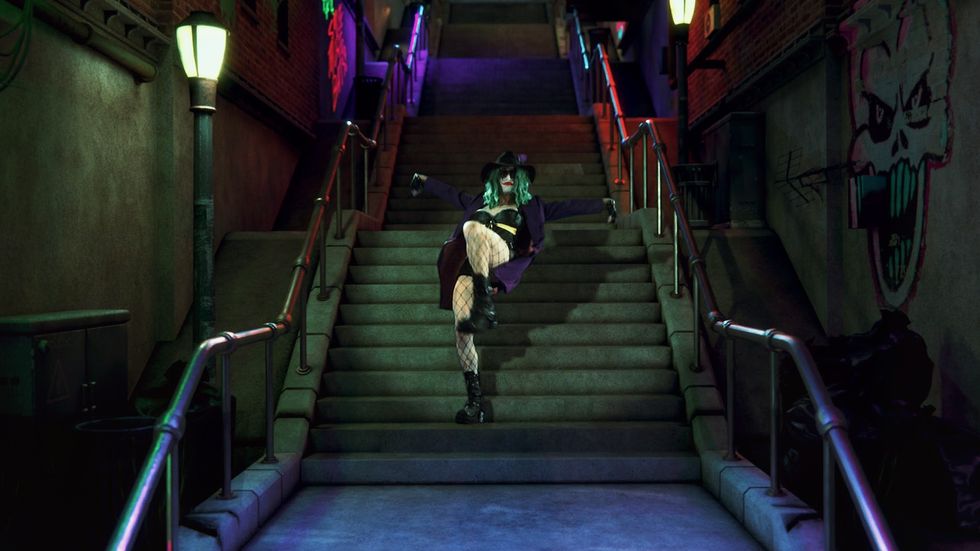
The People's Joker
Courtesy of Altered Innocence
"The core cast is mostly just, they're just friends. Like Nathan Faustyn, who plays The Penguin, is somebody that I've been doing comedy with for about 10 years, and we met at a public access station called Highland Park TV, and we used to do a lot of bits together, we just clicked. He's the only one that could play that character because that character is based on him, too.
We only had five days to shoot, so I knew, like, I need Nate to play Nate in the movie. I can't really have it be somebody else. And Lynn Downey, who played my mom, same thing. It was just like, I can't really remember how I met Lynn, but we just knew each other. And it was like, when I was writing the character, I was like, I really think Lynn could do this, and she's an actor, but I had never really seen any of her work. I just trusted my gut there.
And then Christian Conway plays Dr. Crane in the movie. I met him because I'm a Twin Peaks fan, and he's in Twin Peaks in Return. And it all was just very fluid, that core cast.
A lot of that was because this was cast during pre-vax COVID, and we filmed it before, we had a very small crew. It was like three people on set, myself included. And that was it just because of where we were at. And then, the bigger cameos really came out of the fact that like Tim Heidecker, is somebody that I've been working with since I've been in LA.I started out as an intern at Abso Lutely Productions, and I was a director and an editor, and a producer at Abso Lutely.
Tim's always just kind of been somebody who's been in my corner and just one of my favorite people to put in stuff and collaborate with.
And then, the rest, it was the same sort of thing. I worked with Bob Odenkirk on a show called Birthday Boys. And Maria Bamford, I had been a fan of Maria since I was a kid, but Bri knew her because Bri was a head writer on Lady Dynamite.
So it was just rallying all these people together that we had known from alternative comedy spaces and going like, here's this thing we're making that is about our lives as this fringe comedic performers. And all of them were pretty eager to do it.
I'm shocked that Bob Odenkirk wanted to be in the movie, but he was so on board. His only request was that I make his character look kind of fucked up."
Working With an Unconventional Post Workflow
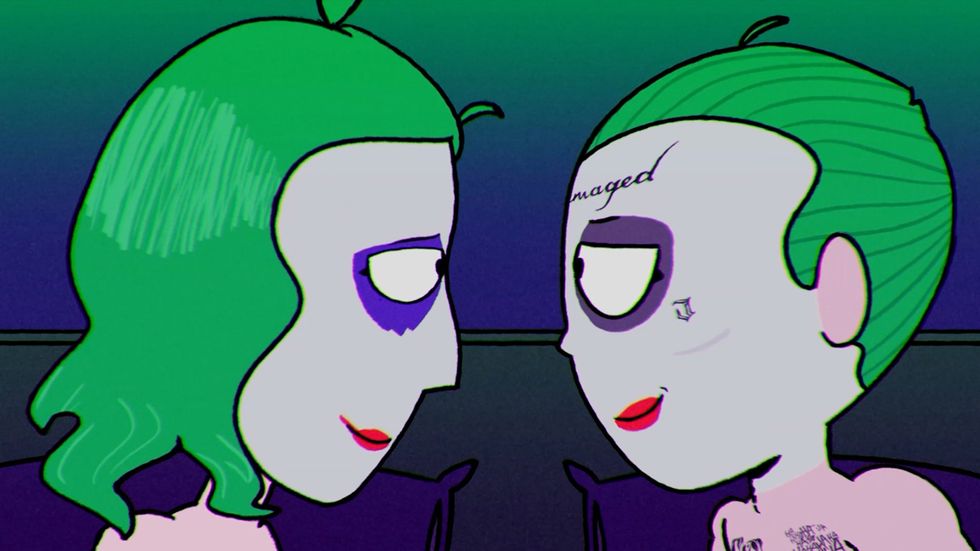
The People's Joker
Courtesy of Altered Innocence
"Our shooting script was about 80% complete. I would say, we didn't even really have a final locked script for that shoot, and that was because there were just a lot of moving pieces and things that I was still wanting to fall in the place.
Some overall structural things about the film that we were still figuring out and I wanted to keep, I don't know, I really like how a lot of this kind of genre movies are made. You're making animatics of sequences at a script stage, or you're doing pre-vis design before your script is locked because it's a visual medium, so you should have that stuff worked out.
One of the things I hate about working in television is how segregated all the departments and all the stages of production are. It's certainly not a way that I like to work. I really do feel like it's supposed to be integrative. So getting to that point of that five-day shoot, I had a version of the movie basically storyboarded. I had an animatic cut of the movie that I made before we ever got to set, and that was specifically just so I knew what my lighting schemes were.
It's funny because I've met with some executive producers and stuff who watch the movie and then go like, "What a great idea to shoot this on green screen because then you could just put anything behind it." It's like, "That's not what I did." I had to figure out what my lighting schemes were.
If you want to see a movie or a project where that's what you're doing, watch Tim and Eric Awesome Show. That's an instance where it's like, "Yeah, we're kind of just shooting it on green screen." There's a rough plan, but we're certainly not doing animatics and storyboards. So it's still required a lot of planning, even though there was a lot of looseness."
Vera's Punk Advice to Indie Filmmakers
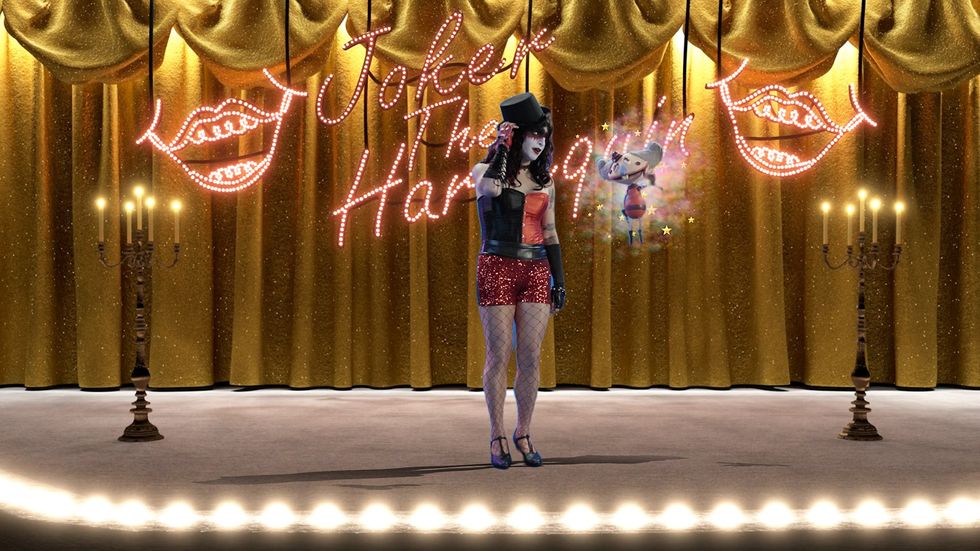
The People's Joker
Courtesy of Altered Innocence
"Don't get a complex over it. Nobody likes a comedian that's perpetually living in victimhood and complaining about their rights getting trampled on.
There's one thing that I don't want aspiring filmmakers and aspiring artists to watch this movie and think. "That's it. That's what I got to do to make my first movie. I need to parody a huge IP."
I can't tell you how many festivals I've gone to and stuff where we've screened it, and then I've had a film student or somebody who's just starting out, come up to me and be like, "I've got this great idea for The People's Harry Potter or The People's Star Wars or whatever."
I don't think The People's Joker is by any means, an archetype of film that filmmakers should move towards as far as the IP and parody aspects of it. But what I would love for people to see in watching it is two things.
One being indie filmmakers, "marginalized filmmakers", people like me who are punk weirdos who don't have a ton of financial support from the industry. We can make genre film. We have that. We don't need to be making quiet, sad, meditative, boring indie movie trauma pieces all the time. I think that's the other thing that really works about The People's Joker is it is a queer coming-of-age movie. It plays by all those tropes, but it does it in a genre space.
The other piece too is just, I worked in TV for 10 years. I was told a lot of rules about making things. For instance, when I worked with Sacha Baron Cohen on Who Is America, the note he would always give me is, you're doing too many jokes at once. There's too many jokes happening at once. You can only do one joke at a time. The audience can only take in one joke at a time, and it would drive me nuts.
I'd be like, "That's not how I watch stuff. I can watch stuff multiple times if I want to see all the jokes." That was one of the rules that I broke, and there were a lot of instances like that. I mean, even just the fact that we're playing with a lot of analog and sort of alt-comedy aesthetics and VHS and stuff, and we're doing it in a way that's very sincere, and very sweet, and very centered around the emotional experience.
That's another note that I would constantly get is, you can't be sincere one second and then ironic the next. And I'd always be like, "Yes, you can. Yes, you can. You can do whatever you want in art."
I think that's the other piece to this is, if you're an aspiring filmmaker and you watch this movie, I want you to know that every step of the way, I trusted my intuition. I listened to not up here, I didn't listen to my ego. I didn't listen to what my agents were saying. I didn't listen to what even my friends were saying a lot of the times. I just trusted in my heart what feels right in this moment. I just intuitively made this movie knowing that I knew what I was doing and that whatever it was going to end up being was what it was supposed to be.
That's the other big takeaway I think people should have from this as artists is just like, tell that story that only you can tell, and when people start saying to you that you're telling it wrong, tell them to fuck off and just do what you want. This is a medium where we're supposed to be taking risks, and we're supposed to be making yourself look foolish in the process, and it's about vulnerability, and take the archetypes, shatter them, and rebuild them and make them your own, because that's what they're there for.
That's what myth is."
The People's Joker is now showing in select theaters.
- The 'Joker' Ending Explained ›
- What the Final 'Joker' Trailer Can Teach You About Originality and Homage ›
- Why You Might Never Get to See the Best Movie from TIFF ›
- Writer-Director Vera Drew Says 'The People's Joker' "Will Screen Again" ›
- Navigate Genre and Gender With the Intricate Score of 'The People's Joker' | No Film School ›
- Dissociate From Election Anxiety With These 10 Punk Movies | No Film School ›











